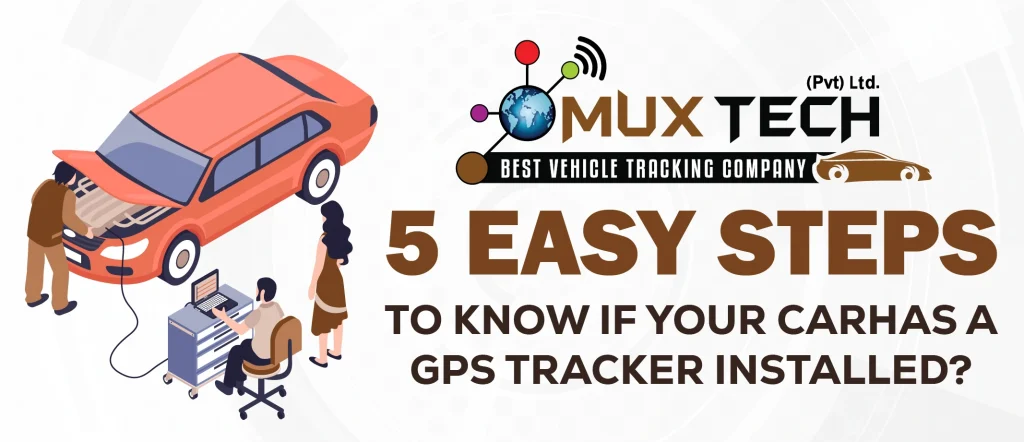5 Easy Steps to Know if Your Car Has a GPS Tracker Installed?

Imagine a world where every move you make is tracked, monitored, and recorded. While it may sound like a plot from a science fiction thriller, the reality is that GPS-tracking technology has become increasingly prevalent in the automotive realm. So, how can you determine if Your Car Has a GPS Tracker Installed? ensuring your privacy and peace of mind?
In this gripping guide, we’ll explore the telltale signs and expert insights that you can easily apply to unveil that little machine lurking beneath the surface.
1. Conduct a Thorough Inspection
Begin your investigation by carefully inspecting your vehicle. Look for any unfamiliar or out-of-place devices attached to the exterior or interior of your car. Focus on areas such as:

2. Uncover Anomalies in Electrical Systems
A covert tracker might utilize your vehicle’s electrical system to draw power. Keep an eye out for unexplained battery drains, flickering lights, or other electrical irregularities that cannot be attributed to any other known issues with your vehicle.
3. Beware of Strange Noises
Some vehicle trackers emit low-frequency noises or interference that can be detected with the right equipment. Listen attentively for any unusual buzzing, clicking, or other unexplained sounds while in your car or even when parked in a quiet location.
4. Scan for Radio Frequency Signals
Specialized radio frequency (RF) detectors can help uncover the presence of GPS tracking devices. These detectors can identify and alert you to the transmission signals emitted by hidden trackers. Conduct a thorough scan of your car, paying attention to areas where trackers are commonly concealed.
5. Analyze Unusual Behavior
Vehicle trackers often communicate with external receivers or data loggers. If you notice any strange or suspicious behavior, such as unknown vehicles frequently following your movements or an abrupt increase in unsolicited communication, it could be a sign that your car is being tracked.
What to do if you find a GPS tracker hidden in your car?
Now, if you’ve uncovered the presence of a car tracker on your beloved car, it’s crucial to take decisive action to protect your privacy and regain control of your journeys. Follow these expert recommendations and reclaim your automotive sovereignty.
1. Document the Evidence
Before removing the vehicle tracker, carefully document its location and take photographs as evidence. This documentation may prove invaluable and legal action should become necessary.
2. Remove with Precision
Removing a car tracker requires a steady hand and meticulous attention to detail. Use specialized tools or seek professional assistance to ensure a clean and thorough extraction. Be careful not to damage your car while dealing with the car tracker.
3. Preserve the Tracker
While it may be tempting to dispose of the tracker immediately, consider preserving it as potential evidence. Place it in a secure bag or container to protect it from tampering or accidental damage.
4. Inform Authorities
Report the discovery of the GPS tracker to your local law enforcement authorities or cybercrime agencies. Present all the evidence you’ve gathered, including photos and relevant information, to support your case. They will guide you on further steps and help ensure your safety.
5. Strengthen Security Measures
As a precautionary measure, bolster the security of your vehicle. Consider installing an alarm system or enhancing your existing security measures. Stay alert and report any suspicious activities promptly to the authorities.
6. Seek Legal Advice
Consult with a legal professional well-versed in privacy laws to understand your rights and potential courses of action. Seek assistance from the authorities who can guide you through the legal process and support your pursuit of justice if your privacy has been violated.
7. Stay Vigilant with Routine Checks
Even if you don’t suspect a tracker in your vehicle, it’s always a good idea to periodically conduct routine checks. Stay vigilant by performing visual inspections, monitoring your car’s electrical system, and maintaining awareness of any unusual occurrences.
Remember, discovering a hidden GPS tracker in your car is a matter of safeguarding your privacy and protecting your personal security. If you find a covert tracking device, it’s essential to remove it promptly and consider taking legal action, as unauthorized tracking is often illegal.
While these tips can help in identifying potential trackers, it’s worth noting that some tracking devices are designed to be discreet and challenging to detect. If you have genuine concerns about your privacy, consult with professionals who possess the expertise and tools to uncover hidden tracking devices.
In the rapidly changing world of technology, safeguarding your personal privacy and security is crucial. By familiarizing yourself with the signs and taking necessary precautions, you can maintain control over your personal space and keep digital spies at bay.
